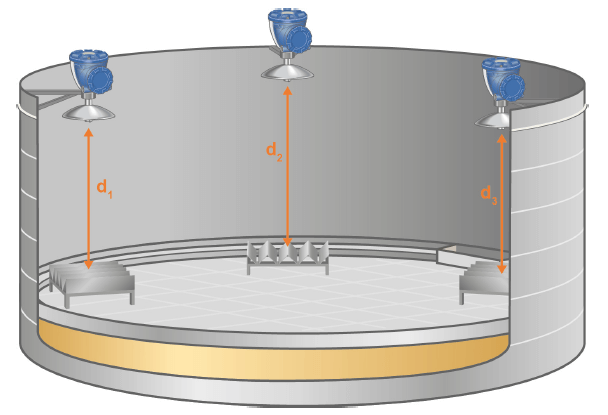Last year during the epic rains of Hurricane Harvey, more than 15 floating roof storage tanks in the Texas Gulf coast region failed during this record-setting storm. These failures resulted in a combined 3.1 million pounds of volatile chemicals being released into the atmosphere across the region, according to reports filed with the environmental agencies.
There are several factors that can lead to failure from inadequate drainage capacity to roof tilt conditions opening exposure to the outside environment. In normal conditions, floating roof tanks have advantages over other types of bulk storage tanks.
Emerson’s Sandie Hughes shared this story with me about the tank failures and pointed me to a whitepaper, Floating Roof Monitoring Using Radar Technology.Research from the International Association of Oil & Gas Producers (IOGP) on the frequency of incidents shows:
- 1 in 625 tanks will have liquid spilled on the floating roof
- 1 in 900 floating roofs will sink
- 1 in 8,300 tanks will develop a full surface fire
The traditional way to monitor and prevent floating roof incidents is to perform manual inspections on a periodic basis. This includes:
…measures such as opening manways into pontoon compartments to inspect inside and perform atmospheric testing, inspecting roof legs and vacuum breakers, ensuring proper function of the rolling ladder, checking/ testing accessible parts of the seals, checking for corrosion in all seams and welds, and many other tasks.
There are many issues with the traditional approach including putting personnel into hazardous locations, extensive permitting to access tanks, limited windows when inspections can be performed, and the time these inspections take. These periodic inspections can also miss issues that crop up between inspections that may lead to an incident.
Automation can help.
An Automatic Floating Roof Monitoring (AFRM) system means operators can be certain that their floating roof tanks are working as intended. It extends continuous, around the clock monitoring to the roofs, and automatic alarms connected directly into the control room gives immediate notice if a floating roof shows abnormal behavior.
 These systems detect how well the roof is floating by measuring for tilt conditions.
These systems detect how well the roof is floating by measuring for tilt conditions.
A roof tilting more than normal is one of the early indicators that something is amiss; for example a pontoon may be punctured, there may be liquid pooling on the deck, or there may be vapor trapped under the roof.
Radar gauges, typically used for level measurement in bulk storage tanks are very good for measuring for tilt conditions.
Three or more radar gauges are placed evenly around the perimeter of the roof. Gauge data is sent to the control room and the operator interface software, where roof tilt is tracked by automatic comparison of the distance measurements. Alarms can be configured to warn the operators if the tilt exceeds a predetermined value, indicating the roof is not operating as normal.
Download the whitepaper to read more about how considerations for these AFRM systems including alarming, communications, selection of non-contacting radar or guided wave radar technology, and the user interface to interact with the AFRM system.
Join us at the October 1-5 Emerson Exchange conference in San Antonio, Texas for sessions on floating roof monitoring, tank gauging and radar level measurements. Some great sessions to attend include:
- Prevent incidents and increase efficiency with floating roof monitoring
- India’s largest Lube Producer uses Wireless Tank Farm Management to improve Efficiency and Safety
- Improvements in system gain losses across terminal and pipeline tank farms
- Wireless Tank Monitoring for Speed, Efficiency and Reliability
- Utilization of Non-Contacting Radar for timely Inventory Accounting
- Practical proof testing & verification in overfill prevention applications

